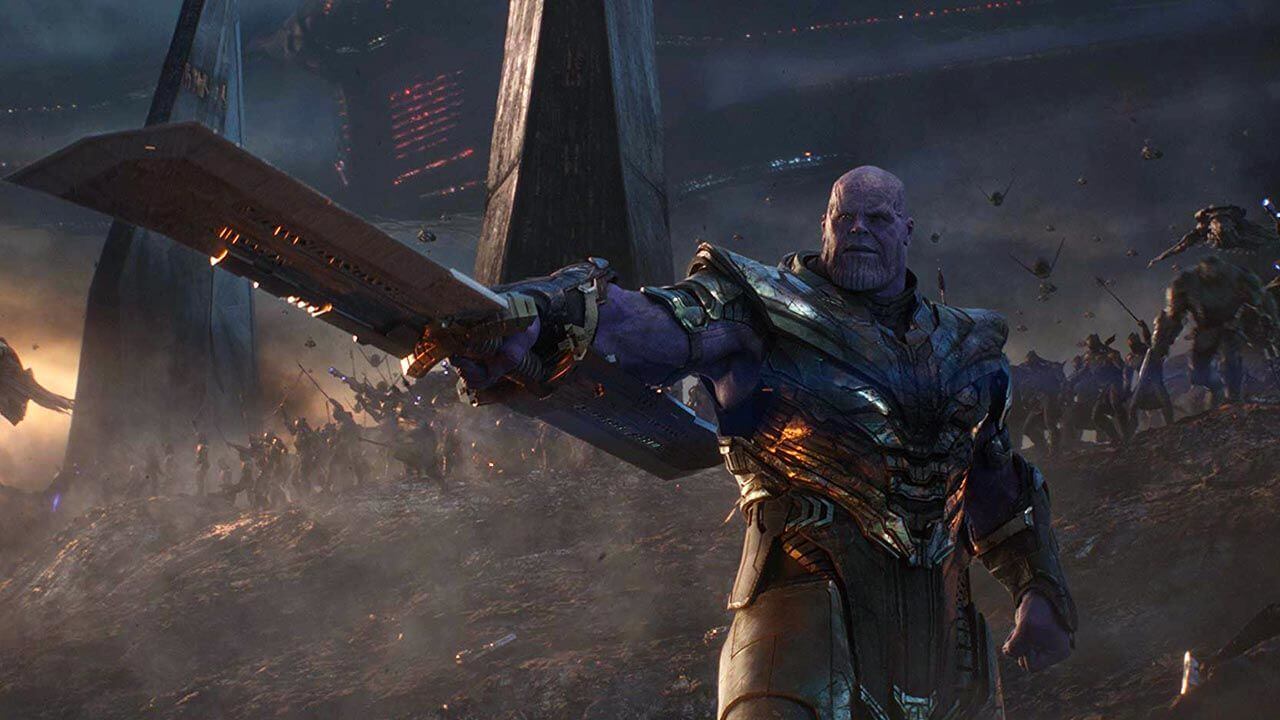Thanos, Greenies, Hippies, and Black Superman
One of the most talked-about aspects of the entertainment industry in the last few years has been its increasing politicization, with a heavily leftward bent. This isn’t the first time it’s happened (the great John Nolte covered the modern history of Hollywood temper tantrums in a great piece from two and a half years ago, although I like a couple of the movies he deems “garbage” – and I love Charlie Wilson’s War), but it feels even worse now, in the wake of their severe hatred for the current President and all who support him. The entertainers themselves make no secret of this, and they proudly declare that their output will be littered with lectures for the peons who dared defy them in 2016. Even the Marvel Cinematic Universe, one of the last franchises that were decidedly for everybody, seems poised to go down the woke rabbit hole (to the glee of the deranged), and its representatives are now attacking their fans on Twitter.
But every now and then, there’s a beacon of hope we can cling to as the very notion of fun is threatened. It’s subtle, as it always must be these days, but over the summer I noticed a small trend, particularly among the villains in some of the higher-profile movies: Thanos in Avengers: Endgame (and last year’s Infinity War, of course), the eco-terrorists in Godzilla: King of the Monsters, the Manson Family in Quentin Tarantino’s Once Upon a Time… in Hollywood, and Brixton and his organization Eteon in Hobbs & Shaw. The trend is that these villains, their motivations, and their worldviews are decidedly left-of-center. It’s hard to believe, given the fanaticism of La La Land lately, but there’s a heap of evidence that these sneering bad guys are the embodiment of different aspects of leftist philosophy and methodology, particularly in the modern era.
*SPOILERS FOR AVENGERS: ENDGAME, GODZILLA: KING OF THE MONSTERS, HOBBS & SHAW, AND ONCE UPON A TIME… IN HOLLYWOOD*
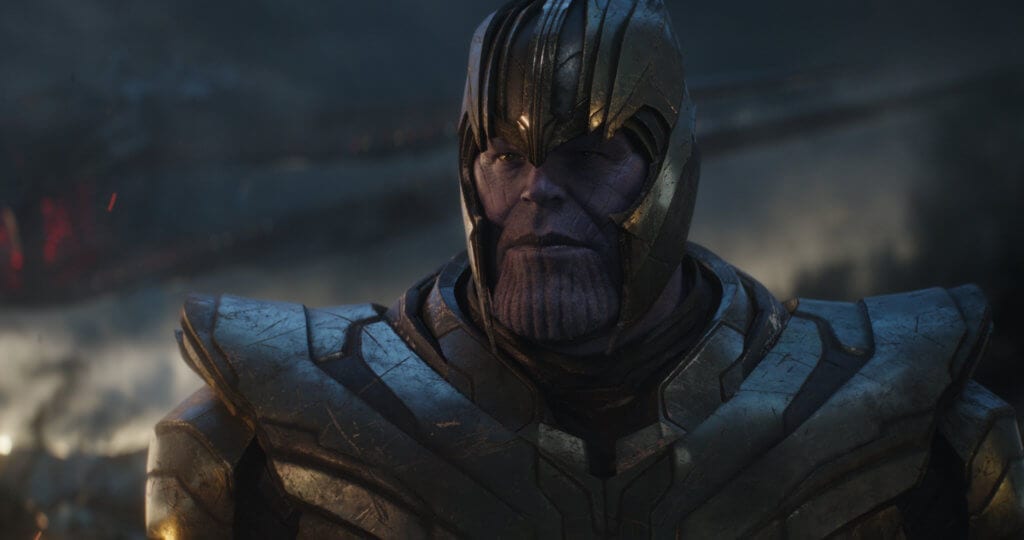
Take, first, Thanos. His goal is an environmentalist’s version of Noah’s ark. He wants to eliminate half of the universe’s existence to conserve the resources he’s convinced are so limited that we’re all destined to die, and soon. He’s bypassed the notion of cutting carbon emissions and outlawing air conditioning and gone straight for taking out the human race, or at least a large part of it. Thanos’ activism has turned into fanaticism; he is so convinced of the righteousness of his crusade that he will sacrifice anyone, including his daughter, to achieve it. In one of Endgame’s best moments, Thanos reveals that he’s even comfortable with his own premature demise, so long as he gets his greener future, marrying the climate alarmist with the jihadist. (“And that is destiny fulfilled” is quickly becoming one of my favorite villain quotes.)
Part of what makes Thanos so fascinating is that his motivation doesn’t end at misguided altruism; as much at stake as the well-being of the cosmos is his own ego and desire for a legacy. Throughout Infinity War, Thanos never hates the forces arrayed against him; he tells Peter Quill he likes him, he admits to admiring Tony Stark, and he empathizes with Wanda’s sacrifice even as he causes it. He understands their anger and frustration, and while he certainly won’t let them get in his way, he holds no ill will towards them. Even when Thor almost kills him, Thanos simply points out the God of Thunder’s mistake and completes his goal, not even bothering to exact revenge (as Thor attempted). And when the few Avengers who are both alive and can stand up locate him on his vacation planet at the beginning of Endgame, he is at peace with his assured death, once more understanding their bloodlust.
That changes when the Thanos from the past catches wind of the Avengers’ plan to undo his victory. Suddenly, Thanos reveals the true monster beneath the benevolent veneer. The Avengers are now representative of a world that will never appreciate his sacrifice, never see the wisdom in his actions, never come around and realize he is the savior of the universe that he recognizes himself to be. That’s when he gets angry, and when he decides to abandon his “perfectly balanced” 50% genocides in favor of razing the Earth completely; he tells Captain America, the sole hero left standing, that he’s going to take great pleasure in punishing us all for the Avengers’ defiance. Does this sound familiar? His demagoguery is similar to the left’s lashing out at “deplorables” – or “unruly wretches,” in Thanos’ words, who didn’t appreciate him and the gift he forced upon a universe that didn’t ask for it. Where once he patted himself on the back for saving the Earth, he now tells the man who represents the very best of its people that he will enjoy overseeing its complete destruction “very, very much.” He even fires off a recent – and decidedly arrogant – Democratic candidate’s self-congratulation as he once more tries to impose his will on a populace that’s rejecting him. Thanos knows what’s best for you, and he’ll kill you if you disagree.

Similarly, the whacko environmentalist group in Godzilla: King of the Monsters are their own brand of greenie fanatics, dedicated to wiping out a significant portion of mankind (which doesn’t include themselves, of course, making them even less sympathetic than prepared-to-die Thanos) by awakening an army of giant monsters to trample most of us to death. Global warming is the boogeyman again, and Charles Dance’s eco-terrorist leader is determined to stave it off, even if it means the natural world he worships must be purged of mankind. The awakening of the prehistoric “Titans” (the second time this summer a being with that moniker threatens us all) is indicative of these people’s reverence for what came before the modern era, and their seeming desire to plunge us all back into the Stone Age. The more human face of this plot is Vera Farmiga’s Emma Russell, who lost a child in Godzilla’s last monster mash and, more than being a complete greenie nut, is trying to assign meaning to her son’s death. When she realizes the extent of the destruction the Titans will cause, she tries to stop the plot she helped enact, even sacrificing herself to help Godzilla take down the embodiment of the devastation she helped unleash, Ghidorah. (She didn’t want to kill everybody; just most people.)
Ghidorah is the “alpha” Titan, the one who controls the others through his physical superiority – or, at least, he will be if he kills Godzilla. His position as the lynchpin of the eco-terrorists’ plans reveals the misunderstanding at the heart of their quest. Ghidorah is not a product of Earth’s environment the way Godzilla and the other Titans are; he is, like Thanos, an alien invader who seeks to impose his destructive will on us. In fighting a developing world, Emma and her environmentalist buddies are fighting evolution itself, trying to force the world backwards instead of letting it grow, and their champion is as unnatural as their goal. The true representative of Mother Nature is Godzilla, and he’s trying to save humanity, this time from both itself and from the outsider its more destructive elements have welcomed in with open arms and given free rein. His defeat of Ghidorah in the end should prove to the greenies that they were wrong and that nature wants to protect humans rather than shake them off like a dog would fleas. But they’re true believers, and they won’t let go of their dogma, as evinced by the post-credits scene where they begin attempts to resurrect Ghidorah. Not content to inflict their horrors on us, they’ll bend nature to their will, one way or another.
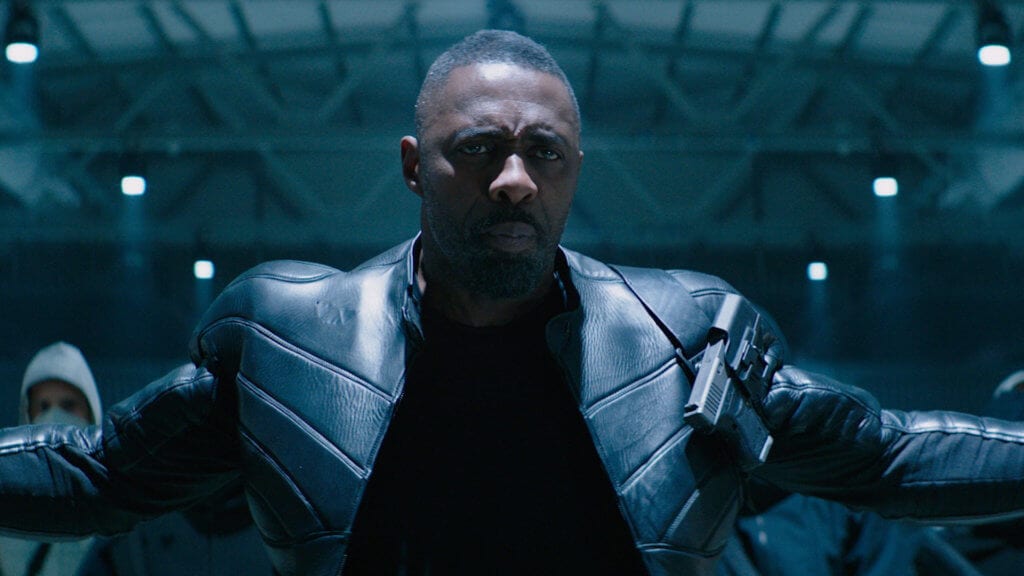
Evil organizations with sinister designs on humanity show up again in Hobbs & Shaw, this time in the form of Eteon. This SPECTRE-like group isn’t quite as focused on the environment as it is on the perceived imperfections of man. Eteon believes that humanity is wicked and incomplete, unable to be our best because we aren’t willing to do the hard work to better ourselves. To fix that, they have a spiffy super-virus they’d like to use to – like Thanos and the Godzilla baddies before them – wipe out most of humanity; unlike their summer-season predecessors, though, Eteon wants to rebuild us and make us better. They’re continually developing technology that will physically improve us, but they’ll dole it out only to the worthy, which isn’t most of us. Their main physical representation in the movie is Brixton, a mercenary left for dead to whom they gave technological enhancements and turned into a super-soldier (“Black Superman,” as he refers to himself). Brixton was given the enhancements because he proved his dedication to Eteon’s mission, taking three bullets to try to recruit Deckard Shaw to their ranks. Once more, we’re faced with a true believer (not the Stan Lee kind) whose fanaticism is like that of a religious fundamentalist; Brixton even tells Shaw that people can’t be trusted to make their own choices, and something like Eteon is necessary to control them and, in so doing, improve them. Now, who do we know that thinks people need to be regulated into compliance with their every whim?
It doesn’t stop there. Eteon’s soldiers have guns that are DNA-coded only to be operated by them, a Democrat talking point in their efforts to chip away at gun rights. They control and manipulate the news media and, as such, can frame reality any way they choose; they do so by airing the fake news that Hobbs and Shaw are the real terrorists, putting the heroes on the radar of every law enforcement and intelligence agency in the world. And the name of the virus they want to use to destroy us all is “Snowflake;” wokeness, it’s being argued, is a disease with which the left wish to infect us, killing us from the inside with, I imagine, crippling offense at the benign and an unrelenting urge to signal our virtue. The ways in which they’re undone are suggestive as well. The coded guns are hacked and deactivated, rendering them little more than paperweights and leaving the army of henchmen defenseless against a bunch of big guys with clubs; Snowflake is removed from Shaw’s sister Hattie, who made herself the carrier of the disease, with tools from gas-burning cars that must make the Eteon boys cringe; Brixton is defeated when two of the humans Eteon so despises rely on each other rather than technology meant to wipe them out. The brave new world can’t stand up to some good old-fashioned elbow grease.
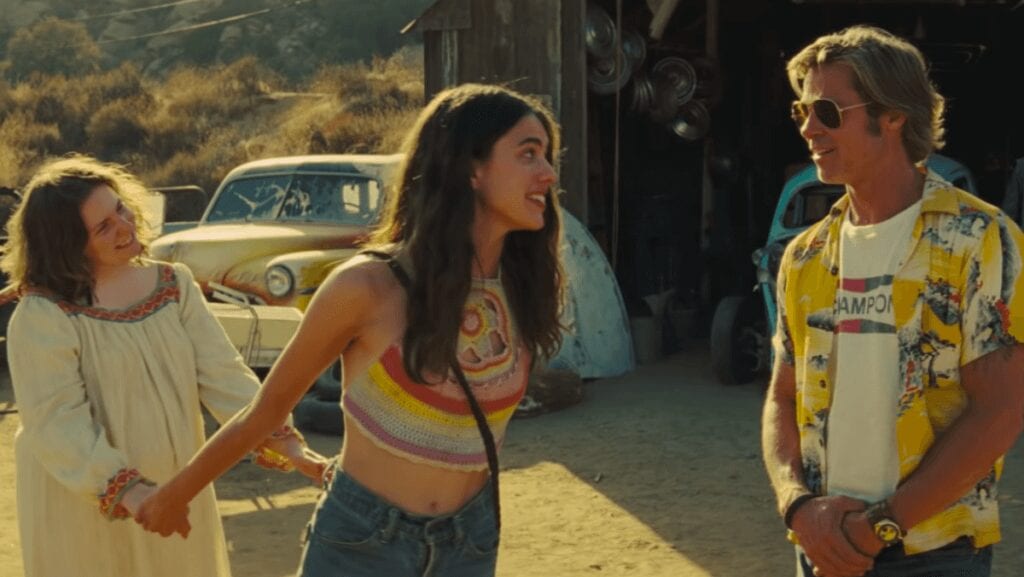
Quentin Tarantino’s Once Upon a Time… in Hollywood differs a bit from these other films because its villains are not aliens or spy-novel rejects, but actual historical figures. The Manson Family really existed, and they really committed horrendous acts of evil at the behest of their twisted leader. Tarantino uses these thugs to show how the modern left-wing terror groups are nothing new, and they’ve been casting a pall over the country and the culture for a long time. When we first see the Manson Family, they’re just random free-love hippies scattered here and there throughout Hollywood. The most prominent one is Pussycat, a flower child type who’s always trying to hitch a ride from Brad Pitt’s Hollywood stuntman Cliff Booth. She seems like a sweet, innocent teenager just looking to have some fun, but when Booth finally does give her a lift, she slowly reveals herself. She’s underage, but offers sexual favors to Booth, not caring what the consequences to him would be if they’re caught. Her pretty face hides poor hygiene, a physical manifestation of the rot within. And when she takes Booth to the Spahn Movie Ranch, he sees still more of the Manson Family’s vileness. They’re a bunch of freeloading bums, taking advantage of a doddering old movie producer so they can indulge in their hippie-dippie lifestyle free of charge, all the while casting a working man like Booth as the real problem. Booth is disgusted with them but realizes there isn’t much he can do about them.
Things get very interesting when Tarantino starts to compare them to Antifa. The hippies try to intimidate Booth with their numbers, and when that doesn’t work they damage his car, feeling completely justified in property destruction because, hey, they’re the good guys, right? They’re all about peace and love, just like their current-year counterparts are all about freedom from fascists. In the film’s climax, though, the comparisons really start to become clear. Tex Watson, Susan Atkins, Patricia Krenwinkel, and Linda Kasabian, the Manson Family members who killed Sharon Tate and her friends in real life, arrive at their destination dressed all in black and wearing face masks, just like those Antifa criminals, and they’re looking to attack defenseless people to impose their values on them – in this case, to get them to stop making violent movies. Just as Antifa uses actual fascism as it claims to combat what they claim is fascism, the Manson Family uses real violence to stop pretend violence. In Tarantino’s perfect world, they pick the wrong house and the soul of a nation is saved, but reality is much less lenient with us, and the hippie murderers depicted in Once Upon a Time… in Hollywood are that much scarier because we know they still exist today.
All of these villainous examples can be further understood by looking at the heroes who oppose them. Thanos faces a whole lot of Avengers, but the big three are a beer-swilling man’s man who loves his weapons, a flag-wearing patriot who believes in the rights of the individual, and a self-sacrificial billionaire who could’ve simply lived his life in peace and been all the better for it but chose to save us from tyranny instead. The eco-terrorists of Godzilla: King of the Monsters are opposed by scientists and nature’s chosen champion, while Emma’s counterpart is her estranged husband, a man who lost just as much as she did but wants to put his faith in the love of his family rather than the hate of left-wing tree-worshippers. Eteon and Brixton are up against a couple of toxically masculine buddies who reject authority and revel in their individuality, as well as a woman who won’t play the role they demand her to play. And the Manson Family goons meet their makers at the hands of a macho tradesman who loves his dog and his freedom, and an actor who plays all those “problematic” roles they hate so much (and, in one of their cases, a legal immigrant). All of these heroes embody at least one thing the left hates, and they emerge victorious each time.
Why is this? For what reason would a Hollywood that seems increasingly obsessed with inflicting its worldview on us present us with tent pole movies featuring their ilk as the villains and those they despise as the heroes? I suspect that, for all their posturing, they know that, at the end of the day, the movie business is just that: a business. No matter how much they want to harangue us about the environment and the folly of free will, they know that most of their audience doesn’t really like those things. The fascistic left is scary, especially right now, and having the bad guys in a movie represent that is likely to strike a chord with moviegoers. Moreover, there is something about freedom and individuality that speaks to an elemental aspect of us as humans. Like the Avengers, like Hobbs and Shaw, like Cliff Booth, like the tortured dad in King of the Monsters, we don’t take kindly to having our rights and choices taken away, we don’t like seeing our fellow man suffer because some tin-pot dictator decided it’s for our own good, we don’t react well to being told there’s something wrong with us because of the way we were born, and we’ll be damned if we’re going to let a bunch of shiftless, entitled punks intimidate us. And, luckily for our entertainment value, we’re Hollywood’s bottom line.
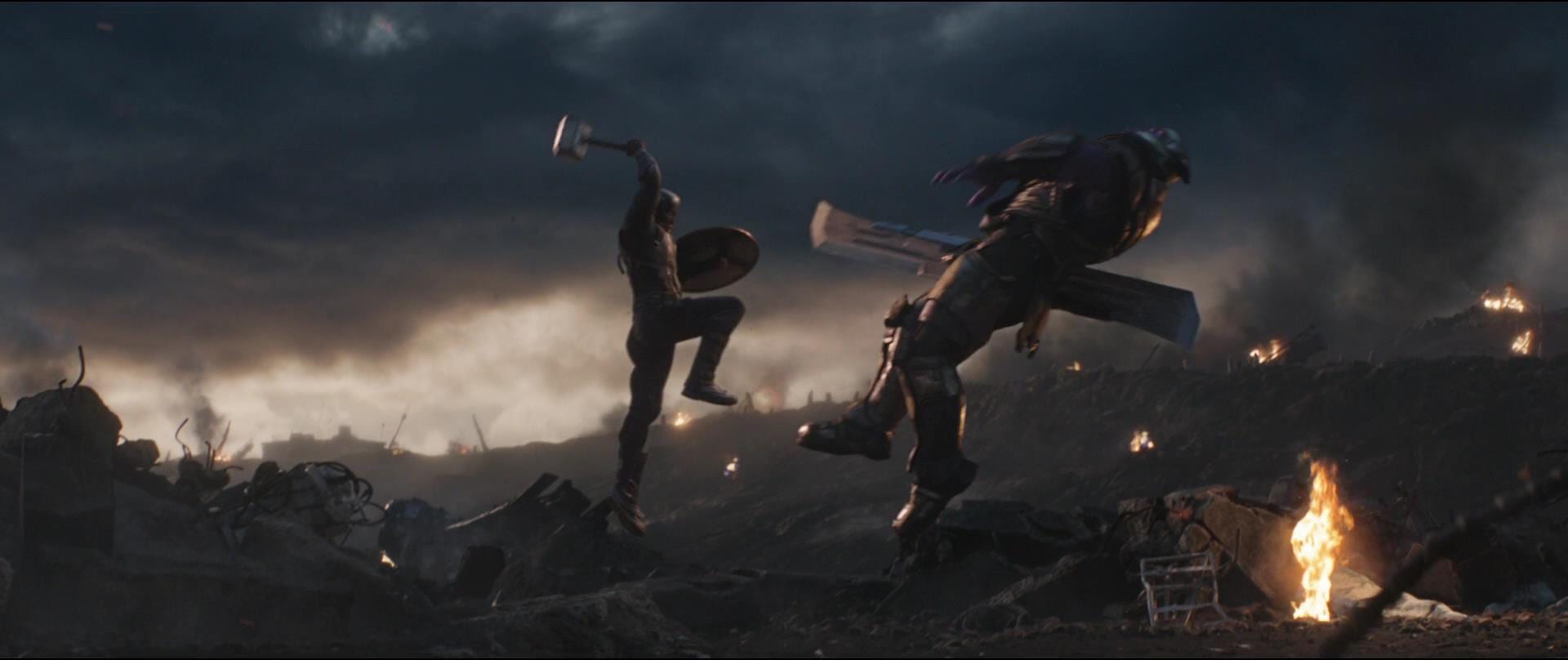
The fun side of the movie landscape looks bleak; we’re about to lose the MCU, Star Wars is better off forgotten, and everything that was once cool is now being remade to fit a joyless modern standard. But this summer has given me hope, if only a shred of it, that for all its posturing, Hollywood gets it; we don’t want what they so desperately want to give us. Even Spider-Man: Far From Home, which didn’t fit the mold in terms of its villain, wasn’t some leftie diatribe, and took a funny swipe at fake news as an aside. Disney seems to be leading the charge in the woke surge, but if enough other studios can manage to avoid being swallowed up by the Mouse House, we might get some nice counterprogramming. Now it’s on us to get to the theater and see these flicks; Angel Has Fallen is just a couple of weeks away, and if its predecessors are any indication, it should appeal to the patriot in us all.

